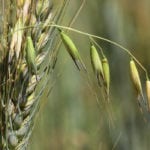
Stories by Barb Glen

Wild and free: that’s beginning to describe wild oats rather well. The “wild” is a given, right in the name, and the “free” is embodied in the weeds’ freedom from in-crop herbicide harm. “We have wild oat seed lots that can have blanket resistance to both Group 1s and Group 2s, meaning they’re resistant to […] Read more

App makes instant weed ID possible
It’s facial recognition software for weeds. That’s one way Brent Nicol, digital farming specialist for Bayer CropScience, describes Xarvio Weed Scout, an app that identifies weeds. He helped farmers test it June 20-21 during the Farming Smarter field school in Lethbridge. “This is the second year we’ve been up and running,” Nicol said. “It’s still […] Read more

Egg producers question feasibility of free-run
Consumers pressure restaurants and food companies to make the practice mandatory, but who will pay the extra costs?
A steady stream of restaurant and food companies proclaim intentions to use eggs only from free-run operations in the future, but egg producers wonder who is willing to pay the cost of more expensive production methods. Some barns have already moved to systems with enriched housing, defined as larger cages with nesting areas, dust baths […] Read more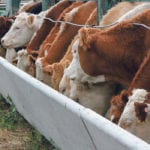
Alta. survey finds unease with growth hormones
College students conducted the survey in Lethbridge, where residents are very familiar with the cattle industry
In a city that lies at the heart of Canada’s intensive livestock operations, it may not be surprising that most Lethbridge respondents to a survey think farmers and ranchers take care of the environment, use water responsibly and treat livestock humanely. But there is one thing they don’t like: the use of growth hormones in […] Read more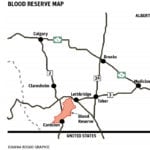
First Nations concerned about grassland loss
Residents of the Blood Reserve in southern Alta. worry about farming practices conducted on their land by non-natives
STANDOFF, Alta. — The people of the Blood Reserve hold cultural and spiritual connections to the land in Alberta’s southwest. Some are worried that non-native farmers issued permits to farm some of the reserve’s 200,000 cultivated acres are adversely affecting the health of that land. They also fear for the future of the other approximately […] Read more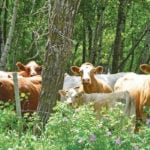
Timely treatments key to tick control
The best time to treat cattle might occur after they are already out on pasture, requiring another trip through the chute
The mere mention of ticks seems to give people a case of the creepy-crawlies. The bite itself is nasty but some ticks can also transmit disease, notably Lyme disease. “Ticks put the fear of God into people for some reason,” said Dr. Roy Lewis, an Alberta-based veterinarian. But ticks are also an issue for cattle […] Read moreEgg producers confident supply management is safe
Egg farmers say they are confident the federal government will continue to defend supply management despite ongoing pressure from the United States. American pressure so far has focused on dairy products, but eggs are also part of Canada’s supply management system, as is poultry. “I’m actually very confident with our government,” said Egg Farmers of […] Read more
Government thought responsible for ensuring sustainable ag: survey
Agriculture student involvement in a Lethbridge College survey earlier this year led the Citizen Society Research Lab to focus on agricultural issues. The survey asked 1,288 randomly selected adult residents of urban Lethbridge about their views on several agricultural practices. In general, results showed those living in a city where agriculture is the economic engine […] Read more
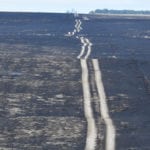
Alberta ag minister visits the big burn
Producers near Hilda, Alta., tell Oneil Carlier that recovery from last year’s wildfire has begun, but it will be slow
The area near Hilda, Alta., that burned last fall in a wildfire is no longer black but damage to pasture and cropland remains evident. Andy Kirschenman, whose family sustained crop, equipment and building losses in the fire, including his parents’ home, said recovery has begun but it will be slow. “It’s hurt, you can tell,” […] Read more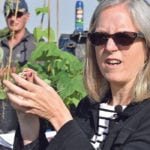
Pea diseases elude southern Alta. researchers
No one in the crowd visibly winced when Agriculture Canada research scientist Syama Chatterton explained her team’s goal for field pea plots. “We’re trying to get as many diseases as possible.” Inoculating crops with common diseases is necessary to identify lines with resistance. Chatterton told those at a recent Farming Smarter “plot hop” that she […] Read more




